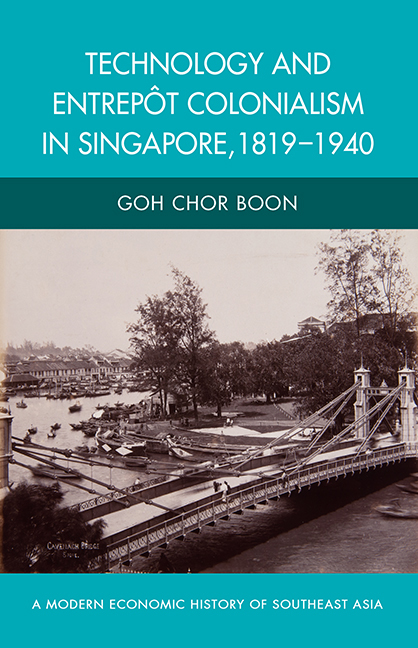Book contents
- Frontmatter
- Contents
- List of Figures and Tables
- Notes on Currency
- Introduction
- 1 Technology and the British Empire
- 2 Pioneers of Change: Entrepreneurs and Engineers
- 3 Maritime Technology and Development of the Port
- 4 Introducing Technological Systems
- 5 Sanitation and Public Health
- 6 Agriculture and Colonial Science
- 7 Food and Singapore Cold Storage
- 8 Politics of Imperial Education
- 9 Technology Transfer and Limited Industrial Growth
- Conclusion
- Bibliography
- Index
8 - Politics of Imperial Education
Published online by Cambridge University Press: 21 October 2015
- Frontmatter
- Contents
- List of Figures and Tables
- Notes on Currency
- Introduction
- 1 Technology and the British Empire
- 2 Pioneers of Change: Entrepreneurs and Engineers
- 3 Maritime Technology and Development of the Port
- 4 Introducing Technological Systems
- 5 Sanitation and Public Health
- 6 Agriculture and Colonial Science
- 7 Food and Singapore Cold Storage
- 8 Politics of Imperial Education
- 9 Technology Transfer and Limited Industrial Growth
- Conclusion
- Bibliography
- Index
Summary
The British administered its rule in their Asian colonies around the use of indigenous clerical and professional skills. Those who aspired to join the rank-and-file of the government services and British companies had to better themselves through acquiring an English education. In British India, English education was initially provided by missionaries, but in the 1860s, Departments of Public Instruction were created and were responsible for the development of a growing network of English-medium schools. Similarly in Hong Kong, most of the colony's seventy government-supported schools taught English by 1900. Even in Britain itself, the educational system, never considered as the most progressive of Britain's institutions, resisted the introduction of applied sciences into its university curricula. Up until the end of the nineteenth century, England had no formal institutions imparting technical education, and engineers received their training as apprentices. Indeed, India provided her colonial master with useful development models of technical institutions to replicate. The colony had established engineering colleges at Poona, Calcutta and Madras in the nineteenth century.
In the case of Singapore, the progress of education generally lacked behind the rate of economic change during the period of British rule. The ruling elite carefully steered the educational rudder so as to preserve their economic and technological status quo. The limited opportunities in English and technical education within a laissez-faire educational system meant that the people generally lacked the educational standards to understand Western science and technology, thus inhibiting the growth of a technological culture that could facilitate the transfer and diffusion of specialized skills and technical knowledge to the indigenous population. This is compounded by the racial prejudices of colonial administrators, who harboured the notion that Western education, including technical education, was not appropriate for the indigenous people. Instead of operating as an agent for economic and social modernization, the laissez-faire and often haphazard education policy in Singapore constituted a divisive force which reinforced existing communal and social barriers. Up to the 1950s, the colonial educational policy was not “national” in character and failed to promote social integration. It caused unnecessary tension between the Anglophile elite and the vernacularly-educated cohorts and further exposed the pluralistic nature of the Singapore society.
- Type
- Chapter
- Information
- Technology and Entrepot Colonialism in Singapore, 1819–1940 , pp. 196 - 220Publisher: ISEAS–Yusof Ishak InstitutePrint publication year: 2013

